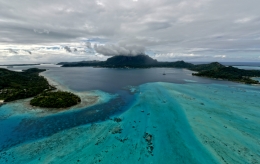25 March 2014
 Researchers from the University of South Australia (UniSA) have joined forces with French researchers to combat the spread of the mosquito borne Zika Virus, as French Polynesia and New Caledonia fight a massive outbreak of Zika fever.
Researchers from the University of South Australia (UniSA) have joined forces with French researchers to combat the spread of the mosquito borne Zika Virus, as French Polynesia and New Caledonia fight a massive outbreak of Zika fever.
With its origins in Africa, the virus has been found in the Asian region including outbreaks in Indonesia and Malaysia and now further into the south east of the Pacific.
Concerned about the potential for more severe outbreaks French authorities have funded the nation’s top research institutes: the Institut Louis Malarde in Tahiti, and the world famous Institut Pasteur in Paris, to find a solution.
Bringing its own experience of combatting the mosquito-borne epidemic of Ross River Virus throughout the South Pacific Basin in 1979-80, UniSA researchers will work with these institutes to try to improve the surveillance and control of mosquito-borne and other infectious diseases in the Pacific.
Adjunct Professor at UniSA’s School of Pharmacy and Medical Sciences and the Barbara Hardy Institute, Philip Weinstein says the University will provide critical experience and expertise to the international project.
“We have research students looking at the environmental drivers of Ross River Virus outbreaks in Adelaide, so the research team can benefit directly from UniSA’s involvement in similar studies at an international scale,” he says.
State-of-the-art antibody testing facilities in French Polynesia will be rolled out for the project and be used to measure and establish the difference between endemic, epidemic, and emerging infectious diseases.
Having done similar work in Samoa, Prof Weinstein will bring this expertise to the project.
“Epidemics can be driven by a variety of different environmental conditions in different places and at different times; it is critical to map out the ecology of disease transmission if appropriate public health interventions are to be recommended to protect the community,” Prof Weinstein says.
UniSA’s Pharmacy Head of School, Prof Jason White, says work on the project has already begun and will provide a fertile platform to establish international research collaborations for UniSA staff and students that will also make a vital contribution to the health of communities in French Polynesia and New Caledonia.
“This is a wonderful example of our expertise being employed to address a significant health problem in our region and, at the same time, it is ensuring our research remains internationally connected and relevant,” Prof White says.
Media contact: Michèle Nardelli office: 08 8302 0966 mobile: 0418 823 673 email: Michele.nardelli@unisa.edu.au




